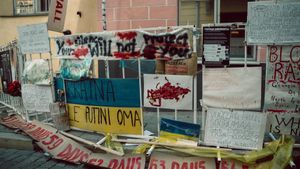The COP29 climate change conference is taking place against the backdrop of Donald Trump's re-election as President of the United States, stirring both concern and determination among global leaders. With climate action at stake, the talks are showcasing the resilience of international cooperation, as the UN’s climate chief Simon Stiell assures attendees of their commitment to tackling climate issues, regardless of the political climate in the U.S.
Stiell's announcement set the tone for the conference, emphasizing, “Global action on climate change is strong and will endure,” echoing sentiments from leaders concerned about the potential repercussions of Trump's historic move to withdraw from the Paris Agreement during his first term. The stakes are high as nations converge in Baku, Azerbaijan, for discussions about finance, fossil fuel dependency, and cooperative solutions to climate change.
At the heart of the COP29 discussions is the urgent need for finance to help developing countries adapt to climate challenges and shift away from fossil fuels. Although the current pledge stands at $100 billion annually, richer nations are facing pressure to expand their contributions. Many leaders argue a steadfast approach to climate policy is necessary to safeguard their economies from the increasingly dire impacts of climate change.
Trump’s recent policymaking has sparked fears of regression, particularly within the U.S. as he expressed intentions to abandon the Paris Agreement again and rollback key elements of the preceding administration’s climate agenda. During the conference, John Podesta, the U.S. climate envoy, voiced frustration but upheld optimism about America's clean energy future. He stated, “Even with new headwinds, we won’t revert back to the energy system of the 1950s,” reinforcing the notion of perseverance against political changes.
Indeed, the specter of Trump's influence cannot be overlooked. His previous administration saw significant rollbacks of environmental protections, heightening anxiety within the international community. Participants at COP29 worry Trump's policies could undermine the global ambitions set forth to mitigate climate change, especially his attacks on regulations he deems excessive.
Podesta's press conference included stark reminders of recent climate disasters—wildfires, flooding, and unprecedented heatwaves—which have made it abundantly clear: “None of this is hoax. It’s real. It’s life or death,” he warned. By framing climate action as not just important but necessary, he rallied attendees, particularly the younger generations, highlighting their role as future leaders who understand the stakes involved.
The discussions at COP29 are not merely about adhering to previous agreements but actively seeking progress and accountability within the framework of existing policies. Many nations remain steadfast, recognizing the need for proactive approaches, especially in light of worsening climate conditions observed globally.
Although the U.S.'s position appears uncertain under Trump, global leaders are working collaboratively, illustrating how the momentum from organizations, local communities, and advocates can still forge effective pathways toward sustainability. “We are committed to real progress,” Podesta asserted, nudging the attendees to focus on collective achievements rather than political setbacks.
Experts at the conference emphasized developing nations' struggles as they navigate the stark realities of climate change impacts. An area of focus remains financing solutions for these countries to bolster their resilience and implement necessary adaptations. Every discussion position appears to center on not leaving anyone behind, ensuring equitable access to climate support, and maintaining diplomatic bridges even as the U.S. shifts its strategies.
Stiell reiterated this sentiment, reminding everyone present, “Global cooperation is the only way humanity survives.” His assertion served as both encouragement and motivation—reminding world leaders to unify and face the storms together, both literally and metaphorically.
With the world watching, COP29 organizers keep reiterative calls for adherence to science and facts, urging leaders from all sides to engage meaningfully, adapt to challenges, and implement real solutions to save lives and sustain ecosystems. They recognize the path ahead may be fraught with difficulties due to political upheaval, yet they remain unwavering in commitment to shared goals and collective responsibility.
For the upcoming negotiations, the emphasis will linger not just on commitments—but verifiable actions. The conference aims to boost collaborative efforts among nations to prevent climate catastrophes from solidifying the divides between rich and poor. With the COP29 being positioned against the humming movements of Trump's leadership, the role of global opinions, unity, and advocacy will remain pivotal.
The discussions also take place with heightened awareness of new climate-fueled disasters threatening economies globally, prompting officials to take action. Many within the advocacy community set their hopes on youth movements influencing policy shifts not just at home but around the world, highlighting the potential for long-term transformation.
Overall, the COP29 conference stands as both a challenge and opportunity. Leaders are urged to remain resolute and forward-focused, ensuring whatever decisions stem from the discussions result not just from political quandaries. Rather, they aim to establish frameworks for sustainable growth and environmental consciousness.
While the next few years may see shifts based on national priorities, the dialogue within this conference is bound to shape future resolutions, emphasizing resilience forged through cooperation amid uncertainty. The stakes remain high, and it is this commitment to action against climate change—a focus driven by facts, collective will, and unyielding spirit—that defines the conversations at COP29.



